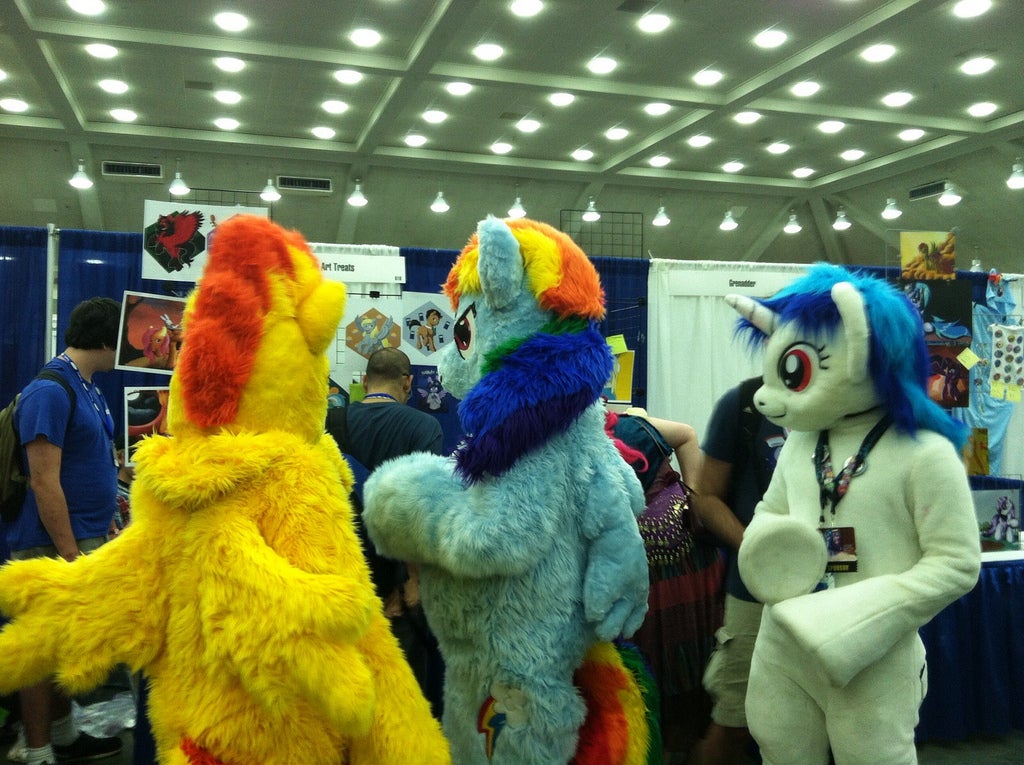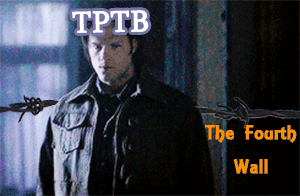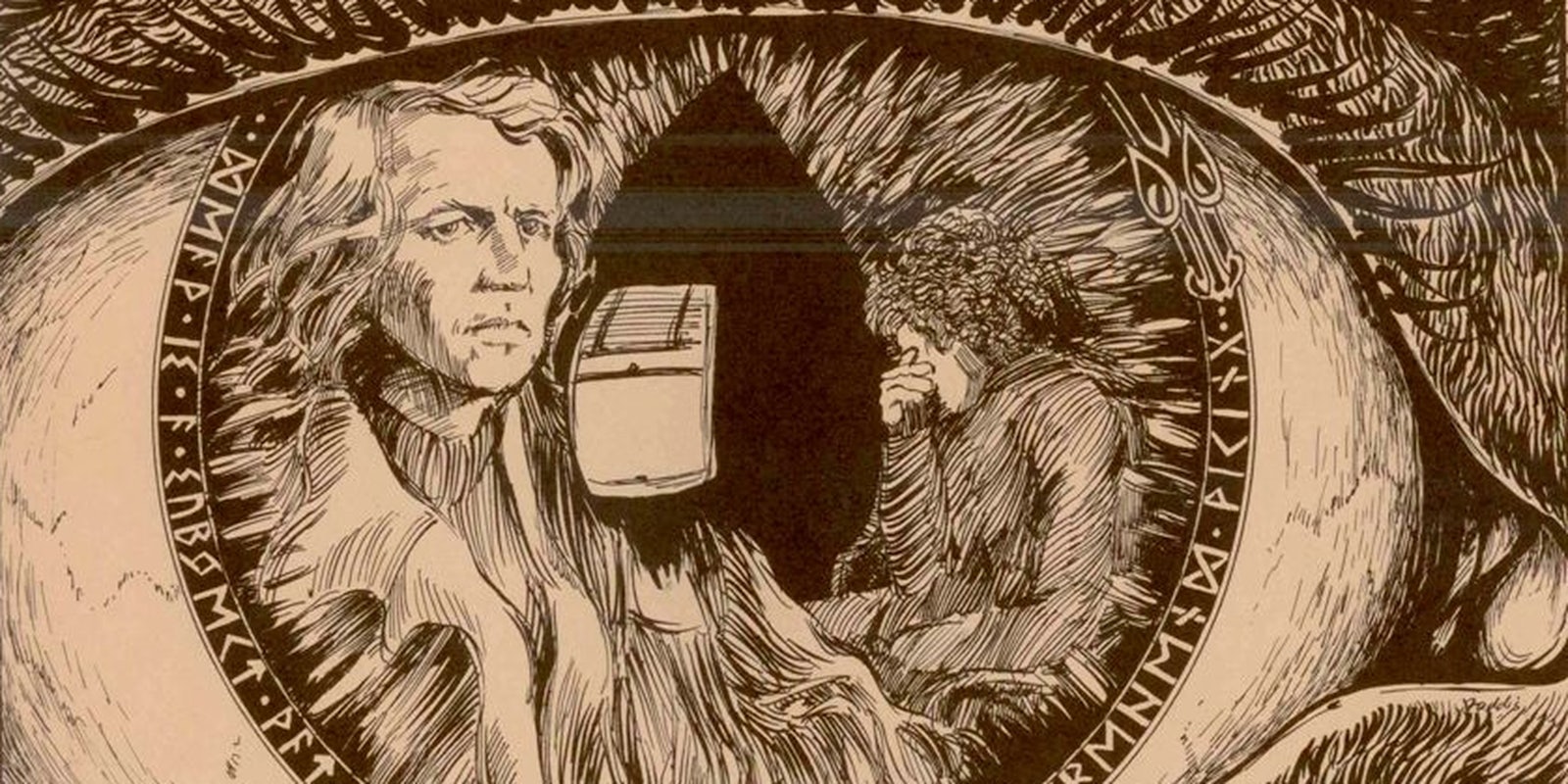BY GAVIA BAKER-WHITELAW AND AJA ROMANO
What is fanfiction? That’s the question magazine articles and TV segments have been attempting to answer for upwards of 40 years now, usually without doing much actual research into the topic.
Maybe this was a valid question back when folks were still sliding Kirk/Spock zines under the tables at Star Trek conventions, but in the era of Fifty Shades of Grey (look, we had to namecheck it at some point) and Amazon’s licensed, for-profit fanfic publishing service, you’d think that fanfic explainer articles would be on the way out.
Most millennials are at least vaguely aware of what fanfic is, and their parents can presumably just Google it like anyone else. Right?
Not so much, apparently. More than a decade after the Harry Potter craze kicked fanfic culture straight into the mainstream, we’re still seeing regular appearances from that most embarrassing of journalistic genres: the poorly researched thinkpiece expressing shock, horror, bemusement, and condescension for fandom and the (mostly female) fans who write fanfiction.
And it’s not just fringe publications who get the whole concept of fandom wrong. It wasn’t long ago that BuzzFeed enraged fans with one of those “How geeky are you?” quizzes. Although BuzzFeed of all places should have known better, its definition of what made someone a geek managed to leave out 90 percent of popular fandom activities, along with the vast majority of the geek population, i.e. not-a-white-dude.
So for anyone out there who has just been hired to explain the intricacies of fanfic culture to a confused and ill-informed audience, here are a few misconceptions we can get out of the way before you even start:
-Myth: It’s written as “Fan Fiction”
-Myth: “Fandom” is a morphing of “kingdom”
-Myth: Fanfic writers are mostly dudes
-Myth: Fanfic writers are sexless, fat, repressed middle-aged spinsters
-Myth: Fanfic is bad for teen literacy
-Myth: Most fanfic is on Fanfiction.net
-Myth: Slash fanfic is the equivalent of lesbian porn for straight women
-Myth: All fanfic is super weird
-Myth: Fanfic is just practice for “real” writing
-Myth: Fanfiction is plagiarism
-Myth: The fourth wall is made to be broken
Myth: It’s written as “Fan Fiction”
No, it’s not. The word is “fanfiction.” It’s not Fan Fiction or FanFiction or fanfictions or fan-fiction. It’s just fanfic, for short. Get it right. Having lately added the term to its lexicon, the Oxford English Dictionary hedges its bets and includes both “fan fiction” and “fanfic.” Here in fandom, however, we usually say “fic,” “fanfic,” or “fanfiction.” The adjective form of fan is “fannish.” This is most often used in the context of things like, “I feel fannish about X” or to discuss “fannish practices,” i.e. all the things that fans typically do as a culture. If we’re talking about slash fic, it’s “slash fic,” “slashfic,” or most often just “slash.”
When you write fanfic as “fan fiction” you’re implying that a) you’re not one of us, because if you were, you’d call it fic like normal people, and b) you’re thinking that “fan” is an adjective that somehow separates our fiction from normal-people fiction. Fanfiction is a literary format with its own subgenres. You wouldn’t call a play “stage fiction” or a movie “film fiction.” They’re things. Fanfiction is a thing.
If you need help with other terminology, here’s a handy way to brush up on your fangirl lingo.

Photo via Wikimedia Commons
Myth: “Fandom” is a morphing of “kingdom”
It’s a common misassumption, but no, the word “fandom” isn’t a shortening of “fan” and “kingdom,” but rather, as used originally by the sports fans who created the word back in the late 19th century, a truncating of “fan” and “domain.” The difference between the idea of a “fan kingdom” and a “fan domain” may not seem like much, but in practice, the former is a fantasy that smacks of an unfairly attributed sense of entitlement. “Fan domain” is a more practical way to talk about the purview that fans have over their own community, not to mention the creative works, discussions, and other kinds of fanworks that they produce.
Myth: Fanfic writers are mostly dudes
No. No, no, and no.

Look, just Google that shit, dude—or look it up on Fanlore. In addition to the ample amount of research that academics and acafans (an academic who’s also a fan) have done on the vast communities of women writing fanfiction on the Internet, we dare you to go to the Internet’s main multi-fandom fanfiction hubs—LiveJournal, Wattpad, Archive of Our Own, Fanfiction.net, AdultFanFiction.net, Tumblr, Movellas, Quotev, AsianFanfics—and interact with the fanfiction writers there. Unless you specify that you’re male, you will nearly always be assumed to be female or genderqueer until proven otherwise.
Women are the writers of fanfiction. You’re on female turf when you enter fanfiction communities. Don’t let anyone tell you otherwise. (Seriously, go to Wattpad and try to find a dude. We’ll wait.)
Sure, there are definitely a bunch of men who actively participate in the fanfic community. But the vast majority of fanfiction writers on the Internet are women or non-cisgendered, we’d estimate around 95 percent.
Which leads us to the second frequently encountered stereotype by people who manage to get past this first one:
Myth: Fanfic writers are all teenagers or modest young women who shouldn’t be exposed to this kind of Internet filth
The fanfic audience may mostly be women, but they’re certainly not all kids or teenagers. Also, the places where pre-teen readers mostly hang out (fanfiction.net and Wattpad, which we’ll get to in a minute) don’t allow adult material. Your typical fanfic fangirl is likely to be around college age, but there are also plenty of older participants—even on Tumblr, which is famous for being full of impenetrable teen subcultures. Without sounding like we’re going out of our way to make fandom sound super normal and harmless, most fanfic readers are… super normal and harmless. And not 12-year-olds who are being psychologically warped after being indoctrinated into a sinister cult of Voldemort porn.
This kind of puritanical panicking about teenagers finding explicit material on the Internet is kind of self-defeating. If you’re worried about your kids accessing porn, educate yourself about how the Internet works and talk to them about boundaries. As for older teenagers and college students, you’re probably going to have to resign yourself to the assumption that they already know about sex. Sorry.
Myth: Fanfic writers are sexless, fat, repressed middle-aged spinsters
In the words of Lieutenant Uhura: “Sorry, neither.” There’s no template for what a fan looks like, how successful they might be, what age they might be, or what career they might choose. And if you’ve ever been to Comic-Con or Dragon Con or any number of cons, you’ll note that con attendees run the gamut of all ages, ethnicities, and shapes. Writing fanfiction doesn’t shunt you into the “lonely olds” category. But it’s interesting how the two polar opposite conceptions about fanfic—that it’s written by clueless tween fangirls or by loveless older women—both manage to co-exist as blatantly misogynistic stereotypes, isn’t it?
As we said above, male fans can be found in all corners of fanfiction-based communities. They’re fans like the rest of us. You don’t get a special hat because you happen to be a man who’s decided to like this one Saturday morning cartoon. In addition to, oh, all of Japan, fandoms for animated shows like Adventure Time, Avatar: The Last Airbender, animated DC and Marvel adaptations, and your average Saturday morning cartoon all have vast and mixed fanbases.

Photo by joebeone/Flickr (CC By 2.0)
The only thing special about bronies is that bronies decided they were special, and then decided they needed their own subculture name, special Web apps, navel-gazing documentaries, and even commercials in order to function as a fandom. Bronies have produced an impressive array of fanart, music, and even social media platforms, but this doesn’t really make them different from what female-dominated, online fanwork-based fandom has been doing for decades.
For some reason, though, the media continues to see bronies as far more newsworthy than the Organization for Transformative Works or the Vlogbrothers’ Nerdfighter movement, even though these fandom communities are, like bronies, engaged in social activism and outreach. Most fandoms are, in fact. Dig a little deeper, and you’ll find that bronies are no different than any other fandom community.
Myth: Fanfic is bad for teen literacy
We suppose it kind of makes sense for parents to be worried that reading and writing fanfic is going to teach kids bad literary habits or something. It isn’t as if fanfic has editors, right?
Wrong. Not only do fanfiction writers often become acclaimed and bestselling writers of original fiction, but in the Twilight fandom, fans got together and even created multiple fandom publishing houses staffed by fans as editors and publishers, all working to take popular Twilight fanfic and “file off the serial numbers” to turn it into marketable original fiction. (And yes, this is exactly how your mom came to own a copy of Fifty Shades of Grey.) Hell, some of these writers even continue to write fanfiction after they’re rich and famous.
Most fanfic writers have “beta readers” who read over their work before it gets posted, checking for things like grammar errors and clumsy storytelling. In other words, editors. Plus, there’s a long-running culture of feedback from readers—just take a look at Wattpad, where stories get millions of hits and thousands of comments from eager readers on every chapter. Even if your kid is reading nothing but poorly written boyband fanfic, they’re reading regularly and improving their literacy. And sooner or later they’ll probably become more discerning, and move onto the good stuff. Of which there is a lot.
Which brings us onto our next point: Where do you find good fanfic?
Myth: Most fanfic is on Fanfiction.net
No. Look, just because you Googled “fan fiction” and the first result was fanfiction.net does not mean that FF.net (nicknamed “the pit of voles” by the rest of us fic writers) is where all fanfiction lives, breeds, and dies.
FF.net is just one website among many, and it’s not even the worst website in terms of overall fic quality. We have Wattpad (home of the aforementioned tween boyband fanfic), which is famous for stories with ridiculously huge reader counts but poor literary merit. Then there’s the Archive of our Own (AO3), which is home to a lot of the most well-written fanfic, both adult-rated and suitable for children. And we can’t leave out longtime staple AdultFanfic.net. There’s also a myriad of individual fandom-specific archives and LiveJournal communities, and each of them have their own individual mini-cultures. Basically, if you’re judging fanfic by skimming FF.net, then you may as well be judging the full span of Western literature based on the first book you pick up by the entrance of Barnes & Noble.

GIF via Giphy
Myth: Slash fanfic is the equivalent of lesbian porn for straight women
We can kind of see where this one is coming from, but it’s really not true. First of all, male/male slashfic is definitely not read exclusively by straight women. In fact, in numerous self-reporting polls of fandom done over the years, the majority of members participating in traditional fandom communities have identified themselves as queer or otherwise non-heterosexual. For example, you’d be amazed by the number of lesbians who read and write exclusively about relationships between men, i.e. a gender to which they are not even attracted in real life.
The popularity of slash fanfic invariably seems like a weird kink or a total mystery to outsiders, but there are actually a number of factors at play. Yes, many people like to read male/male erotica because they find it hot, but there’s also the obvious fact that pop culture is completely obsessed with male/male relationships already. As in, Kirk/Spock, Holmes/Watson, every buddy cop drama ever, and the vast majority of popular sci-fi/fantasy fiction and superhero movies.

Illustration via deviantART (CC BY 3.0)
In a male-dominated field that regularly focuses on close relationships between men while sidelining the women, it’s not a huge leap to turn that homoerotic closeness into romance—particularly if you want to see more LGBT representation in popular culture but are thwarted at every turn. Take the TV show Supernatural, for example. Its fans are often derided for being slash-obsessed, but the fact is that Supernatural itself is dedicated to two male/male relationships: Sam and Dean Winchester, and Dean and the angel Castiel. Female characters are routinely introduced as damsels, love interests, or sexy villains, and are then killed off to make way for the intense, obsessive loyalty and love expressed between these three dudes. Slash fanfiction is simply an extension of what viewers are already seeing onscreen.
One of the most obvious yet overlooked reasons for writing slash is that people who enjoy romance enjoy the emotional catharsis of a love that can overcome obstacles. There are few bigger obstacles in life than the social obstacles that gay and lesbian men and women have to overcome to achieve self-acceptance, community acceptance, and real and meaningful relationships. This is the reason that many straight men and women enjoy reading queer romance, be it slash or original fiction.
While gay men will often claim that slash is a way of fetishizing and objectifying them, that’s not really what’s going on here. Again, the majority of slash writers are women raised in societies that constantly reinforce the paradox that if they say no to sex, they’re frigid, but if they say yes, they’re a slut. Add to that the way women’s bodies are routinely objectified while they’re told that sex is shameful, and it becomes very hard for many women to explore their sexuality. For many women and girls, exploring sexuality through male characters provides a safe, shame-free distance, while enabling them to simultaneously soften male characters and imbue them with emotions and characteristics that many real men find it difficult to show because of masculine stereotypes.
Slash’s Japanese cultural counterpart is yaoi, which shamelessly depicts its gay male characters as masculine/feminine archetypes (often regressive) so that young women can identify with the smaller, more overtly feminized uke character. Even though yaoi is about male romance, like slash it’s written by women and is commonly acknowledged as an expression of feminine desire and sexuality. By the same token, slash allows many women to insert themselves into the emotional experience of a relationship.
On top of all this, many slashers claim that they prefer to ship male characters because the vast majority of female characters that exist in media lack agency. They’re used as props for the main male cast, or are fridged, or otherwise debilitated to build up male characters in narratives.
If you’re a fan who wants to write your favorite characters going on adventures and falling in love, but you’re faced with a vast sea of media populated by women who just don’t get to have as much fun or be as complex as their male counterparts, then who would you rather ship Captain Kirk with—Yeoman Rand or Spock? Most slashers are going to ship the two most complex characters together. And for most media, that means the dudes.
Myth: All fanfic is super weird
Fanfic explainer articles love to give weird and creepy examples of fanfic concepts, probably because it makes for a better story than the reality of people writing harmless stories about Captain America and Iron Man falling in love (which, by the way, canonically happened in an alternate Marvel comics universe where Iron Man was actually a woman). Tentacle porn! Dobby/Voldemort slashfic! Bizarre crossovers where the Super Mario Brothers have a threesome with one of the blue aliens from Avatar! LOL, it’s all so weird!
Look, we get it. Fandom is home to some pretty eccentric ideas, and that’s fine. There’s something really heartwarming about the idea of a self-generated community where people can come together to write the Smaug/Bilbo Baggins dragon romance of their dreams. But whenever a mainstream media article exclusively describes fanfic in those terms, it’s probably alienating a whole lot of people who would actually engage with more popular fanfic topics like Harry Potter sequel fics and homoerotic reinterpretations of the Sherlock Holmes books.
The fanfic community’s overall output is extraordinarily diverse, but the vast majority of stories tend to be things that would make sense even to people who have never read a fanfic in their lives: romances where old friends are reunited and enemies recognize a mutual attraction, continuations of long-cancelled TV shows, and explorations of details that never got enough screentime in canon. Characterizing fanfic as a bizarre and threatening subculture full of poorly written Klingon erotica not only shames the people who actually like poorly written Klingon erotica (a perfectly harmless hobby), but it casually dismisses the merit of fanfic and the community that produces it.

Illustration from the 1979 Starsky and Hutch zine ‘The Pits’; Illustration by Signe Landon via Fanlore
Myth: Fanfic is just practice for “real” writing
“If these fanfic writers are so good, why don’t they get published?”
This is one of the very first questions people ask when they’re told that fandom is full of seriously talented authors and artists. Why not go pro? Well, first of all, some of them do. Several published authors admit to writing fanfic in the past, and countless numbers still operate under fanfic aliases while publishing books under their real names. However, becoming a “good enough” writer is not the goal of fanfiction. You may as well ask why someone spends their time knitting or playing football or practicing a musical instrument if they’re not going to try and go pro.
For every fanfic writer who dreams of being the next J.K. Rowling, there’s another who will only ever be interested in writing stuff based on, well, the original J.K. Rowling. The fanfic community forges friendships across the world and has developed a thriving gift economy where people write made-to-order stories as holiday gifts for total strangers. Even if you ignore the issue of literary merit, the way fanfiction is produced and consumed is nothing like the process of producing or consuming a novel, which is typically a very lonely venture on both ends of the reader/writer relationship.
Acafan Catherine Tosenberger has argued that fanfiction’s greatest signifier is actually that it’s un-publishable. That is, really good fanfiction—and there’s plenty of it—is actually so intrinsically tied to its canon that if you tried to just replace the names of characters and places you’d have something unrecognizable and unable to be severed from its original source. That’s not to say that fandom isn’t also churning out a million or so trope-laden, interchangeable coffeeshop AUs that could easily be turned into original fiction. That can and does happen all the time. But at the core of every fandom are fanfiction writers who are drawn to explore those specific storylines. They don’t want to write original fiction. They want to linger a little while longer in the world they love.
We’ve already answered this, right? No, all fanfic is not porn. And all fanfic porn is not bad porn. You’re actually way more likely to find well-written erotica from fanfiction writers on AO3 than from many writers of published erotica. There’s also the fact that when it comes to sexually explicit material, the fanfic community has a pretty unusual attitude compared to mainstream porn, erotica, and many other forms of popular entertainment.
Typically, the most popular and highly-recommended fanfics are long (about 20,000 words and up), well-written, and feature a mixture of plot, character study, and romance. In popular fandoms like Sherlock, Teen Wolf, and Avengers, the most popular longfics focus on a central relationship like Sterek or Johnlock, but also have an action/adventure or mystery plot, and adult-rated sex scenes.
This type of cross-genre mixing is pretty rare within Hollywood narratives, particularly if you’re looking for a sci-fi or action movie that also focuses on sophisticated adult relationships. This limitation is one of the reasons fanfic is so popular in the first place. Even in novels that include sex scenes, unless the book is categorized as New Adult, romance, or erotica, you’re unlikely to get an equal balance of gripping plot and heady sex. Sure, you do see cross-genre mixing in mainstream fiction to a certain extent, particularly in Urban Fantasy novels and high-concept romance lit like Diana Gabaldon’s Outlander series. But it never happens in the kind of popular entertainment most fanfic fandoms are inspired by: Sherlock, Supernatural, Harry Potter, and so on.
Outside of romance and speculative fiction, fanfiction has been the driving force that unites “mainstream” narratives with underground tropes like sex, kink, and other forms of erotica. There’s a huge gap between adult-rated shows like Game of Thrones, and actual pornography. In the world of fanfiction, this division is almost nonexistent. Fanfic sites like AdultFanFiction.net and AO3 are among the only places where you can find this kind of fiction in bulk, and have it be written about characters that you already know you’ll love.
In the real world, we’re used to seeing a pretty clear division between what is and isn’t porn—or at least we were used to it prior to the rise in New Adult literature. New Adult often combines multiple genres with erotica and romance. And how did New Adult begin, again? With the success of Fifty Shades of Grey—a novel that started out as fanfiction.

GIF via allhaleshippingking/Tumblr
Myth: Fanfiction is plagiarism
No, it’s not. Where to begin with this frequently leveled accusation? Let’s start with the basic fact that recursive literature and remix culture stem from centuries of telling and retelling stories that are living, breathing parts of our heritage and culture.
Then consider the way that stories live on and teem and ferment inside of our brains, whether we like it or not. After reading Pride and Prejudice, Jane Austen’s own niece wrote a letter to her while roleplaying in-character as Elizabeth Bennet. Fanfiction isn’t a late-20th-century invention, nor is it a deliberately deviant choice made by infringing delinquents. Fanfiction is something that has been around for centuries but only recently gained a name and a culture.
More practically, there’s an immense and increasing amount of support for the legitimacy of fanfiction. For one thing, franchise tie-in novels and speculative television scripts written for profit are essentially fanfiction in all but name—the only difference is that this fanfiction is corporate sanctioned. (This is also why we deign to call Kindle Worlds a service for fanfiction when it is more accurately a very low-paying franchise tie-in generator.) For another, many modern classics are fanfiction: Donna Tart’s The Goldfinch (fanfiction about a real painting); Pulitzer-winning novels like March (Little Women fanfic) and A Thousand Acres (King Lear fanfic); Robert Altman’s classic noir film The Long Goodbye, which took famed detective Philip Marlowe and plopped him into the ‘70s, because that’s what fanfiction does. The list is virtually endless, and it grows daily.
More and more, authors are coming to be aware of the commonalities they share with fanfic. After he wrote his acclaimed sci-fi novel Redshirts, John Scalzi got referenced as having written Star Trek fanfic so often that he finally decided that’s exactly what it was. It helps that many of the authors who started out writing fanfiction now work as creatives and writers themselves, from fanfic writer-turned-acclaimed novelist Rainbow Rowell’s Fangirl to Steven Moffat writing Doctor Who headcanons years before being tapped to be a showrunner. When the lines between fans and creators grow blurrier every day, it’s hard to keep up the myth of an exclusionary literary establishment. Increasingly, the fans are the establishment. And it’s harder to keep up the argument that fanfiction is plagiarism, no matter how much some writers feel that it’s like selling their children into white slavery. (And yes, that’s an exact quote. Oy vey.)
Like every other potentially infringing thing we do on the Internet every day, from reblogging a photo on Tumblr to uploading a song cover to YouTube, in the U.S. fanfiction writers are protected by a magical thing called the Fair Use clause. The Fair Use clause states that if use of someone else’s work is “fair,” it’s OK. Traditionally, “fair” has usually been granted to purposes of education or commentary, but this is also the clause that allows and protects parody. In a landmark parody lawsuit, Campbell vs. Acuff-Rose, fandom found its cornerstone: the word “transformative.” This ruling created the legal precedent that the more transformative a work is from the original, the fairer its use, even if that use is commercial. That means that under current legal precedent, if your work of fanfiction truly transforms the original, like taking angsty teenage vampires from Twilight and turning them into high-powered adult businessmen who play around with BDSM, you can sell that work. Which is how we ended up, again, with Fifty Shades of Grey.
There is one other ruling that explicitly sets a precedent for the protection of fanfiction under copyright law, though it’s recently been challenged. That ruling awarded transformative status to a ‘90s bestseller called The Wind Done Gone. This book is a non-humorous, non-satirical, critical reworking of Gone with the Wind, but it was deemed a parody while acknowledging its transformative status. As we currently have no copyright ruling in place for fanfiction as a genre or as a grouping of works, this ruling is as close as we’ve gotten to a legal precedent. If a compelling case can be made for the fanwork as transformative, then the U.S. copyright “fair use” clause is fully protective of the work, whether it is done for free or for profit.
Copyright law is very outdated and has yet to catch up to current common copyright practice, which relies heavily on remix culture and the idea of “Creative Commons.” Advocacy groups like fandom’s Organization for Transformative Works and the Electronic Frontiers Foundation frequently engage in legal advocacy for fanworks. As they do, fanfiction gains more and more legal acceptance and protection.
And ultimately, it doesn’t really matter, because, again, the itch to write your own story about that story you just heard is much, much older than copyright. Fanfiction is here to stay.
Myth: Reporters should ask celebrities what they think about the awkward fanfic fans write about them
No. First of all, asking a celebrity to simply “react” to fanfiction being written about the fictional character they portray (and occasionally the actor themselves) is actually shorthand for “I’m a lazy reporter who would rather exploit fans than do the work of rounding up real questions for this interview.”
Secondly, this celebrity who is having lots of slash written about them has already been asked about their thoughts on slash by the other 145 million unoriginal reporters who came along before you and went, “What can I do to be edgy? Oh, I know, I’ll show them the fanfiction about them on the Internet!” They are sick of being asked this question.
Thirdly, depending on any number of personal/social/contextual factors that have nothing to do with the show, the fandom, or the content of the fanfic, being asked about fanfic could make them feel uncomfortable, which means you were just rude and invasive for stupid reasons.
Fourthly, if the actor is worth their salt, they’ll know that reporters asking them to comment on fanfic, on specific ships, and/or slash are all among the worst-case scenarios of that actor’s fanbase. No matter how the actor answers, fans will be hurt. It’s rare to find fandom-savvy actors like Misha Collins and Orlando Jones, who talk about fanfic freely and see it as something to celebrate rather than avoid. And even then, those actors know that fans themselves like to stay on their side of the fourth wall that preserves fandom’s subculture from prying eyes. In the words of Misha Collins, “Don’t talk about it? Right! Because there’s a line! There’s a line! And you’re crossing it! Right now!”
Myth: The fourth wall is made to be broken
The fourth wall is the fandom-created idea that there should, at all times, be a necessary distance and separation between fans and the creators/creative teams of the things they love. The fandom shorthand for “creator/creative team/producers/actors/writers/etc” is TPTB, short for the Powers That Be. TPTB always have the power in any given situation where they interact with fans, because TPTB controls the product fans are consuming. But fans always take those products and do things with them that are outside of the creators’ control, like, oh, turning male characters you might have meant to be bastions of heteronormativity into deeply repressed gay superheroes. This disparity can sometimes cause friction between the two groups. So when fans interact with creators, TPTB have to be extra careful not to disturb the balance that exists between their vision and how fandom has re-imagined their stories and characters. The fourth wall represents the idea that these things co-exist but don’t overlap.

GIF by Aja Romano
Increasingly, the concept of “the fourth wall” has become known among some fans as the idea that fandom is a hidden space that should be preserved and kept out of the limelight. Obviously that’s something that conflicts with the idea of the free press, but it’s also something that responsible journalists should consider before pulling fandom communities into the public eye. Fans should never have their real names tied to their fandom identities and then made public without their permission.
Journalists should also consider whether the purpose of quoting and linking to a piece of fanfic is to enhance a discussion of fandom, or whether the context is simply to incite mockery and titillate readers. If it’s the latter, consider that you’re contributing to a media culture in which fannish practices are routinely mocked, which contributes toward ongoing sexism and dismissal of the predominantly women-based communities that participate in them. Is it really worth it? And, again, 268 million other journalists have made the “fanfic is so weird and funny” joke already. It’s far more rare and far more valuable as a statement on fanfic to talk about fanworks the way you would any other literature or creative practice.
So, if you still feel the need to write an explainer article on “Just what IS this weird fanfiction phenomenon,” there’s one final thing that you really need to take into account: Fanfic is totally mainstream. We’re serious. Jon Stewart references it on The Daily Show. There is a bestselling novel called Fangirl, written by an award-winning author who used to write Harry/Draco fanfic. A fusty midwestern newspaper uses the word “fandom” in their headlines. Writers for Sherlock, Teen Wolf, and other popular stories go out of their way to tease their audience of slash shippers, occasionally to disastrous effect. So unless your target audience is retirees who don’t use the Internet, it’s probably time to give it a rest on the shock and awe, OK?
Clarification: The “Myth: All fanfic is porn” section of this article was updated to eliminate a generalization about romance fiction.
Photo via Scales of Justice/Fanlore
